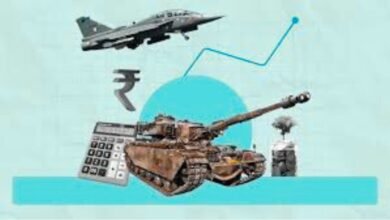Trump Warns Courts Over IEEPA Tariff Powers, Predicts ‘1929-Level Depression’ if Overturned
US President Donald Trump defends his use of the International Emergency Economic Powers Act to impose tariffs, including a 50% duty on India, amid growing legal challenges.

Donald Trump warns US courts against overturning his use of the IEEPA to impose tariffs, claiming it drives record economic gains and cautioning of a Great Depression-style collapse if blocked.
Trump Issues Economic Warning Over IEEPA Tariff Powers Amid Legal Challenges
US President Donald Trump on Friday escalated his defence of the International Emergency Economic Powers Act (IEEPA), warning that if courts strike down his use of the law to impose tariffs, the country could face an economic collapse comparable to the Great Depression of 1929.
Speaking through a post on Truth Social, Trump claimed his tariff policy — including a 50% tariff on Indian imports — is delivering record-breaking stock market highs and generating “hundreds of billions of dollars” in federal revenue.
“Tariffs are having a huge positive impact on the Stock Market. Almost every day, new records are set. In addition, hundreds of billions of dollars are pouring into our country’s coffers,” Trump wrote.
The IEEPA — A Cold War Law in the Modern Trade Arena
Enacted in 1977 during the Cold War, the IEEPA grants the US president broad powers to regulate or restrict international commerce during a declared national emergency. Historically, it was intended for urgent foreign policy or security crises, such as sanctions on hostile regimes, asset freezes, or export controls.
Trump has expanded its application to long-term trade policy, using national security grounds to justify tariffs on multiple countries. Supporters argue this flexibility strengthens America’s global negotiating position, while critics say it bypasses Congress and risks executive overreach.
Legal Storm Brewing Over Presidential Trade Powers
Multiple lawsuits are now questioning whether the IEEPA was ever meant to serve as a standing economic weapon. Legal scholars argue that using it to impose ongoing tariffs — without legislative approval — may violate the US Constitution’s separation of powers.
Some federal courts have already signalled they will scrutinise the scope of the law. Trump warned that a “late ruling” against his actions could devastate the economy:
“It would be 1929 all over again — a GREAT DEPRESSION! That decision should have been made long ago at the start of the case, not now when we are achieving historic success.”
Tariffs, Markets, and Political Stakes
Trump has consistently tied tariffs to domestic economic growth, citing rising stock indices, corporate investment, and job creation in certain sectors. However, independent economists are split — some agree tariffs have protected strategic industries, while others warn they have raised costs for American businesses and consumers.
The stakes are also political. With a presidential election season underway, Trump’s tariff strategy is a central plank of his economic platform, appealing to voters who prioritise American manufacturing and trade sovereignty.
International Impact — India in the Crosshairs
Among the nations targeted, India faces a steep 50% tariff under Trump’s IEEPA measures. The move has sparked diplomatic tensions, with New Delhi warning it could retaliate through counter-tariffs or adjustments in bilateral trade agreements.
Analysts note that while India exports a wide range of goods to the US — from textiles to pharmaceuticals — higher tariffs could reshape supply chains and push exporters to seek alternative markets.
H2: Historical Echo — Lessons from the Great Depression
The Great Depression (1929–1939) remains the most severe global economic downturn in modern history. Triggered by the 1929 US stock market crash, it caused:
- A 25% unemployment rate in the US by 1933.
- Over 9,000 bank failures.
- A collapse in global trade due to protectionist measures like the Smoot-Hawley Tariff Act.
Trump’s reference to this period underlines his belief that judicial intervention in trade policy could have catastrophic consequences, not only for the US but for the global economy.
H2: What Comes Next
The coming months will be decisive. If courts rule against Trump’s interpretation of the IEEPA, it could permanently reshape the balance of trade authority between the White House and Congress.
For now, Trump appears determined to defend his powers, framing the battle as not just a legal dispute, but a fight for economic survival and national strength.





